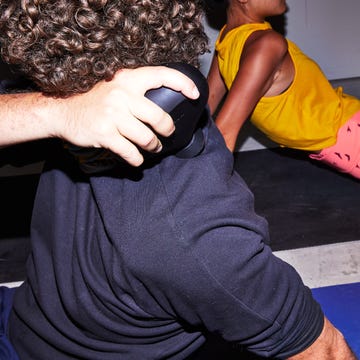In the world of fitness technology, no status quo remains unchallenged for long. Innovation always wins the day. That’s why Wahoo Fitness has made a point of developing new technologies for runners to get the most of their indoor workouts—and the company’s latest release, the KICKR RUN treadmill, is a revolutionary take on the centerpiece item of every indoor running space, with future-facing RunFree technology that lets runners perform hands-free as the treadmill adjusts in real time to their pace and movements.
To understand what makes the KICKR RUN so different from the treadmills that came before it, we spoke to Wahoo Fitness CEO Gareth Joyce about the inspiration and innovation behind the design.
RunFree Technology
The KICKR RUN marks the debut of Wahoo’s RunFree technology, which allows runners to change the pace of their run without touching the controls. Yep, that means no fiddling with dials, no adjusting knobs: As your pace of movement increases or slows, a time of flight sensor detects your position and adjusts the treadmill’s speed correspondingly. “We wanted to create the most realistic running experience possible and that led us to create this all new technology that we call RunFree,” Joyce says. “It’s designed to simulate the experience of running outdoors.” These sensors also enhance runner safety, Joyce adds: “They can detect if you’ve quickly slowed down or stopped running altogether, and then the treadmill will respond in turn.”
When it comes to a technology that asks users to fundamentally alter their approach to an activity, as the KICKR RUN does for those used to traditional treadmills, the most important metric of success, Joyce maintains, is good old-fashioned user feedback. “We’ve been encouraged by the positive response to the KICKR RUN,” he says. “Runners are often surprised at how natural the RunFree experience feels. There’s a lot of ‘where has this been all my life?’”
To further enhance this emulation of outdoors running, the KICKR RUN has responsive surface, grade simulation, and lateral tilt technology that emulates the natural energy return from surfaces like asphalt, tracks, and trails. And for those who prefer a more traditional, hands-on run, there’s a manual mode that allows you to nudge a pair of easily accessible control paddles on the sidebars of the treadmill to adjust your run settings without breaking your stride.
A Clean (and Connected) Design
For the exterior of the KICKR RUN, Wahoo crafted a futuristic yet minimalistic design that keeps the focus where it belongs: on your run. “We wanted to keep the design simple and clean—emphasizing the training technology that matters most to the user,” Joyce says. The treadmill displays your pace, grade, connectivity and run free status. But unlike many treadmills, the KICKR RUN doesn’t come with a built-in screen. Instead, it has a holding dock for phones, tablets, or laptops, thereby encouraging users to utilize their own preferred technology in their training session—or simply forgo screens altogether by pairing to a running watch to record their activity.
The KICKR RUN also seamlessly connects to software platforms such as ZWIFT for a dynamic and interactive training session where the app controls the treadmill and adjusts to reflect the terrain in your virtual workout. “From the moment I hit ‘start’ on my virtual-training app, I don’t touch the controls on my KICKR RUN at all,” Joyce says. “My feet do all the work.”
Made Explicitly for Runners
Joyce views the KICKR RUN as a revolutionary technology for all levels of runners, whether you’re a beginner using a virtual-training app to prepare for your first race, or a seasoned vet trying to break your PR. But, he emphasizes, Wahoo Fitness did include specific technology for advanced runners to get the most out of their workouts: “We’ve really tried to build this for an athlete.” The treadmill can achieve speeds of up to a four-minute-mile pace, a faster mark than most treadmills at its price point. And its full-integration capabilities with virtual-training and fitness apps allow runners to do structured workouts and keep track of their performance data with more in-depth statistics than are available from most gym treadmills.
“We’re trying to remove the boundaries between indoor and outdoor workouts,” Joyce sums up. “Training indoors should no longer feel like a compromise.” And looking ahead, he adds, the Wahoo Fitness team is eager to explore further enhancements, both in new hardware and upgraded software. “Innovation is a continuous process,” he says. “We’re committed to creating an improved experience on an iterative basis.”














